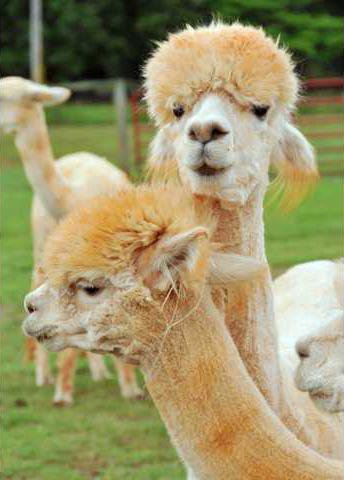Who knew alpaca fur soaks up oil?
Alpaca farmers from around the nation are sending fur to the Gulf of Mexico region to help blockade the oil still gushing from a BP offshore drilling rig that exploded and sank in late April.
In Flowery Branch, Del and Caroline Mixon of Carodel Farms are preparing 200 pounds of alpaca fiber to send to volunteers making booms to contain the spill.
“I was on Facebook and received a message about alpaca breeders collecting and shipping fiber,” Caroline Mixon said Friday. “We shipped off about 100 pounds last week and have another 200 to take to the collecting point. People all over are meeting up and getting the fur to point B to make these booms.”
An explosion caused the massive oil spill April 20, and the drilling rig continues to release 5,000 barrels of oil per day. Efforts to contain the spill with controlled burning, dispersal and plugging the leak have been unsuccessful, and the oil has reached parts of the Louisiana shoreline.
The Mixons are sending fur to The Sunshine and Shores Foundation, which builds booms in a warehouse in Destin, Fla. For them, the donations are personal.
“I hung out in Destin as a kid,” she said. “It was my beach, and even though we live up here now, it’s where we like to go. A lot of people in Gainesville have condos and timeshares down there, and as kids we all vacationed down there. We appreciate where we grew up and what the people are doing down there now to help.”
Mixon even tried the oil-soaking idea herself.
“I put oil in some salt water here and put alpaca fiber in it, and the oil went right to it like a magnet,” she said. “It’s a cool trick.”
Hair salons across the nation are also beginning to donate hair. Although many Gainesville salons hadn’t heard much about the idea on Saturday, a few are beginning to explore the possibilities.
“We’re trying to do research to see where the best place is to send it,” said Summer Myer, the receptionist and assistant for Tiffani and Company Hair Salon. “We put hair into a hair bin, and we figure we should send it somewhere to help.”
The Sunshine and Shores Foundation is one of several organizations along the coasts between Louisiana and Florida that are accepting donations of fur, hair and nylons to build booms. Residents on Florida’s coast, Billie and Jeff Golden started the foundation a few weeks ago when they were worried about wildlife caught in the oil.
“You would not believe how much hair and fur we received today,” Billie Golden said Saturday. “Our 8,000 square foot warehouse is packed floor to ceiling.”
The foundation received 14,000 pounds of hair and fur by truck, which they are stuffing into 12,500 pairs of nylons donated by Hanesbrands, Inc. With all the supplies, the Goldens hope to build 1 million booms that are reusable, but they need more hands to get the job done.
“We’re getting a group from Tallahassee next week, and a great couple from Ohio drove down by themselves to help this weekend,” Golden said. “A young man from Miami ran a 5K marathon and then drove up this morning to help.”
While the Goldens seek volunteers and build booms on the weekends, the Coast Guard off the Florida coast is still waiting for the rig to be patched before attempting large cleanup projects.
“It’s like putting a Band-aid on a broken arm. You’re wasting time until you can stop the flow,” Golden said. “And there’s so much more we need to do to stop this.”
With the Gulf Stream current, Golden is worried about stopping the flow before the oil affects more shorelines.
“Once the Gulf Stream catches it, it’s anyone’s guess where it’ll come up,” he said. “It could go down to the Keys or the South America side near Belize, even Mexico. We’re trying to do the best we can to help on every coast.”




